10 tips and hair hacks to winter- proof your hair
By admin

The harsh cold in winters is your skin and hair’s nastiest nemesis. One has to ensure putting on layers of moisturizers and clothing before even thinking of stepping out of the house. Your hair health too takes a beating in the winter as the season treats it pretty unfavorably. Freezing, chilly air, and severe temperatures damage your hair and render it more susceptible to breaking than in the summer.
Winters are also the time that dandruff is at its peak and scalp health at its worst with all the dryness. It can be quite frustrating to see big flakes of dandruff visible right after hair wash. Here are some methods you can try to reinstate your hair health and make it feel much more nourished if it is starting to look lackluster and lifeless.
#1. Ditch hot water baths and use lukewarm water instead
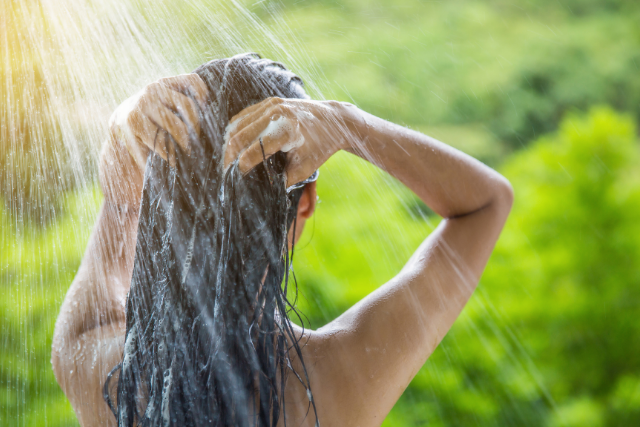
We understand it is chilly outside, and taking a hot water shower in the morning is precisely what you need to get through the day. However, dermatologists have warned us for years that hot water is bad for not just your skin but also your hair. It sucks out all the hydration from your skin, scalp, and hair leaving them dry and lifeless. Dryness can lead you to other worrisome problems like itchy scalp or skin, irritation, rashes, redness, infections, and so on. Your locks too are likely to look frizzier because of it.
Winter is a season when your scalp and hair are naturally dry. A hot water hair wash only makes things worse. You will find that your hair too feels dry and brittle. As a result, you’ll need to adjust the heat of the water you use to bathe or shower. Ideally, you should be using lukewarm water to take baths or showers, as they will keep you warm while keeping the moisture of your hair intact.
#2. Heat styling should be avoided
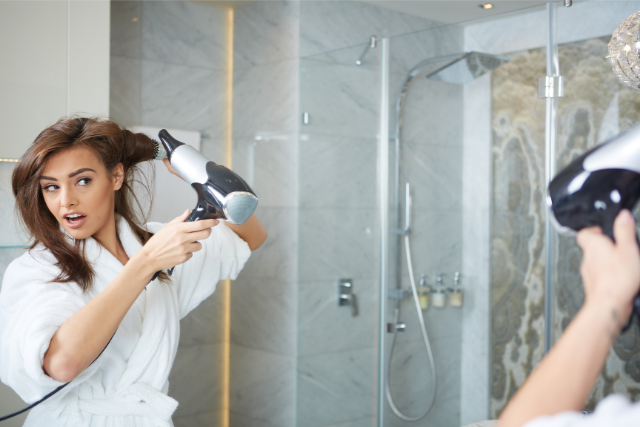
The disadvantages to blow-drying your hair dry are similar to that of using hot water for your baths: blow drying your hair dehydrates it, raising the chances of damage. Drying your hair without using heat may help you keep the moisture in and thereby maintain lustrous and strong hair.
If you are short on time, you can wash your hair in the evenings and allow it to air dry. When your hair is already fragile in the winter, heat styling exacerbates the problem by sucking the moisture out of your locks. Throughout the winter, avoid ironing or curling your hair. Take advantage of this period to experiment with various hairstyles such as twisting, plait, and baguettes.
Additionally, if you do wish to blow dry your hair to style it, use a good number of protective serums or oils before doing it. These create a barrier on your locks preventing hydration to escape your hair and scalp.
#3. Nourish your hair and scalp with oil massages
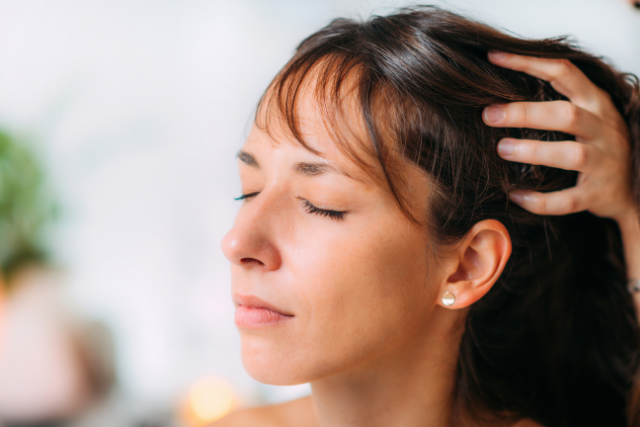
Dryness is the biggest concern that winters bring to our hair’s quality. Therefore, moisturizing it at least once a week is essential. Oil massages on the scalp provide exactly that for your hair. You can use steam to improve the outcomes of the oil you’re using for the massage.
Most hair oils have emollient as well as occlusive properties. This means that they lubricate and soften your scalp and hair, preventing them from becoming frizzy and dry. Their occlusive properties help to keep hydration intact by not letting water escape your locks and roots. Moreover, oil massages improve blood circulation to your scalp, keeping your hair follicles well nourished. Here are things surrounding oiling to keep in mind:
- To eliminate split ends don’t just apply oil to your scalp but also on your hair ends and tips.
- If you are someone who has a problem with oils and their greasiness, consider investing in hair creams. They might be a good alternative as they use non-greasy formulas and have specific purposes. For example, a cream may be anti-dandruff or anti-hair fall. Both of these will have different ingredients better suited to one purpose.
- For best results, always apply hair oil or hair cream to your scalp and hair ends before washing your hair. This is a good habit to cultivate to keep your hair soft and radiant. Keeping them on overnight is recommended for softer hair in the long term.
#4. Make a shift in how you shampoo your hair
Our hair and skin have natural mechanisms that keep them strong, healthy, and moisturized. All they need is a small amount of washing, just enough to get rid of dirt. There’s no denying that your hair, especially during the arid winter days, requires the natural sebum created by the scalp. Frequent shampooing can take away the natural supply of sebum, as well as the moisturization they give. Therefore, during the winter, take extra precautions to avoid depleting your natural hair moisture by over-washing.
- If you have dry hair, restrict your hair washing to a maximum of twice a week.
- Always apply hair oil or hair creams before using shampoo on your hair to avoid a complete depletion of moisture from your scalp.
- Use conditioners liberally after hair wash.
#5. Make through conditioning a priority
This overlooked phase in the hair care routine is possibly the most important winter hair hacks. Throughout the colder months, your hair needs a lot of maintenance, but we recommend that you use it as an opportunity to pamper yourself.
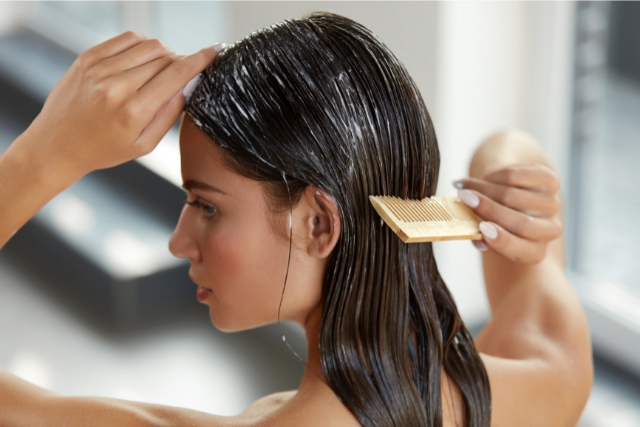
Your hair has little cuticles on its surface that give it its texture. In the winter, due to the cold, hair cuticles trap more dirt and dandruff. Therefore, this is generally a lifeless time for them because they do not get the nutrients and proteins that come with optimal hair pH and moisturization. While shampoos clean your cuticles, conditioners restore their acidic nature that is ideal for your strands.
When your cuticle is clean and strong, your hair seems to be lively and bouncy. Conditioning after each wash ensures that the ideal pH and nourishment to hair cuticles are fulfilled, letting them perform their intended function as a defensive cover. Once a week, deep conditioning should be done, ideally on the same day as oiling. It will not only moisturize but also enrich your hair strands with nutrients.
#6. Wear well-suited headwear
Cold, freezing air barely has any humidity, which is why it sucks out all the moisture in your hair for itself. This winter season, pull out your scarves and other headwear to protect it from this drying effect that comes in winters.
But that’s not all! What kind of headwear you wear also matters? Just like you shouldn’t tie up your hair with tight rubber bands to avoid hair fall, you must also take similar precautions to choose what you cover your hair with. Ideally, use a silk or satin cloth first (which will be in direct contact with your hair), and then layer it with cotton or woollen textiles to shield it from the chilly weather. A headwear made out of cotton or wool can create friction in your hair, resulting in thinning hair and damage.
#7. Beware of static charge
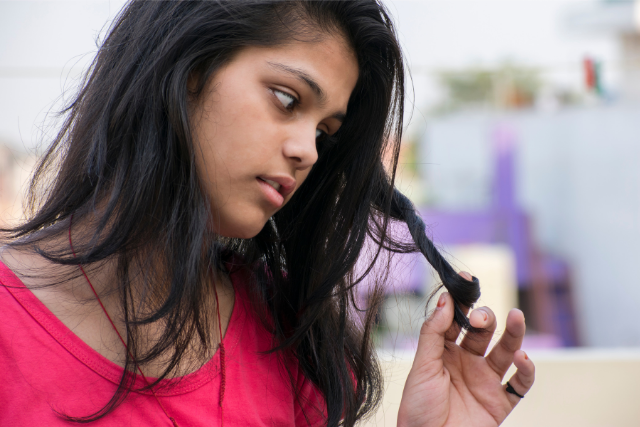
Because of the friction coefficient caused by the absence of dampness in the wind during the cold months, your hair gets electrically charged. This is a common occurrence with dry hair. The static charge can make your hair look frizzy and all over the place, rising from your sides. It also makes your hair vulnerable to harm and breakage. Here are a few pointers to remember to avoid this:
- Use a leave-in conditioner, hair gel, or hair serum to keep your hair smooth. This is especially crucial after a hair wash.
- Dry your hair with a gentle towel or cloth but don’t rub it too much. Be soft with it and dab at places it is possible to dab.
- Consider switching to a satin pillowcase rather than a cotton one. Satin or silk fabrics are smooth and by nature do not rub against your hair or cause friction.
#8. Don’t step out with wet hair
Recall how your mother warned you not to walk out with your hair damp because you’d catch a cold? Well, she was right! But apart from that, another reason to avoid going out with wet hair is that it takes much longer time to dry in winters. Particularly if you have thick and curly hair, drying when you are out can be a difficult chore. With wet hair, the cold weather extends to your hair shaft, pushing your hair towards the peril of splitting and deteriorating. As a result, hair is more susceptible to breaking.
One key wintertime hair care tip to remember is to properly dry your hair when leaving the house. Of course, you still have to avoid blow-drying. To speed up the hair drying process, try sitting under fans and softly soaking excess water from your hair using a towel. If you are in a hurry and need to blow-dry, do so by keeping your hair drier in the lowest heat setting. However, remember to completely commit to blow-drying by dividing your hair into sections and not leaving any wetness behind. If your hair looks frizzy after blow-drying, it has not dried completely.
#9. Detangle your hair right
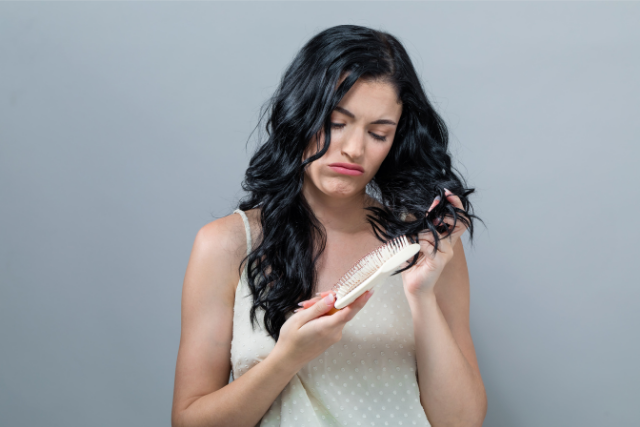
Hair tends to tangle and form knots more when exposed to dry air. As a result, you have to constantly comb your hair to avoid an accumulation of knots and tangles. Here are a few tips to keep in mind when combing or detangling:
- Avoid combing directly from your root to tips if you know that there are tangles you have to deal with. Instead, comb downwards from the centre to lessen the pressure on your head and avoid weakening the roots. Start from your tips, and gradually move upwards for the best results.
- Never comb tangled hair when it’s damp. The frequent tugging of knotted, damp hair enhances the likelihood of hair damage and thinning.
- Do not use sharp-toothed combs as they may irritate your already dry winter scalp. For this same reason, consider switching to wooden wide-toothed combs if you have plastic or metal combs. Wood tends to be less sharp and wide combs pose less challenge to the risk of breakage.
#10. Water is essential to your hair health
In summers, it is hard to forget drinking water as the heat constantly dries your throat. However, in winters, we are likely to forget to get our share of hydration. The water itself tends to be very cold, and we go for drinking hot beverages instead. This is a terrible habit that one has to consciously unlearn.
Water is an important constituent of your tresses. The dry air in winter sucks out the hair’s moisture and water content. Therefore, it is critical to stay hydrated during the winter months to replace the water you’ve lost. If cold water bothers you, keep a bottle of hot water stored in a thermal container. Either way, drink at least 8 glasses of water a day. Hydration guarantees that your hair maintains its strength and lustre from its roots to its ends. When the strands and scalp are nourished, roughness, itching, and flaking are no longer an issue.
Parting notes
Winter can be a fun time, especially for those of us who live in a hot climate most of the year. It brings many positives, like joyful gatherings, warm and fuzzy clothes, the delight of drinking hot chocolate, and festive happiness in the atmosphere.
Swinging wind gusts, dry weather, and cold temperatures, however, can easily damage our delicate hair. Therefore, do not let the chilly winter wind wreck your locks; instead, seal in the moisture to assist your hair in looking glossy and feeling strong. We hope our top 10 winter hair care techniques come in handy for dealing with any hair issues you may have this season!









